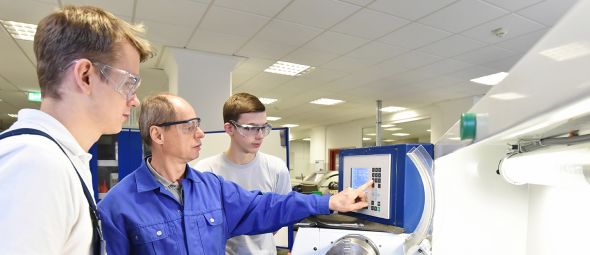Overview
Human capital development—or people’s ability to acquire skills and knowledge through education and training—advances workers’ economic opportunity and strengthens employers and the economy. Yet the complex landscape of skills and training is fragmented across institutions of higher education, public and private providers, and other credentialing programs. More importantly, human capital development alone does not lead to greater economic mobility, as many workers continue to face barriers to reaching their full potential in the labor market.
Working Knowledge

Skills and training
April 16, 2024
Research Summary
Rethinking Career and Technical Education for Individuals Who Are Incarcerated: What Works?
A new study shows that individuals who complete career and technical education programs while incarcerated don’t have better employment outcomes or lower rates of recidivism when measured against a comparison group that did not. Instead of focusing on career-oriented programming, prisons should prioritize individuals with high needs, developing basic education programs and reducing practical barriers to employment.

Skills and training
April 03, 2024
Research Summary
The Key Benefits of Career and Technical Education Programs in High School
Career and technical education in high school is considered a way to increase earnings and education after students graduate, but it also is a tool to reduce the most adverse socioeconomic outcomes in the years immediately following graduation.

Skills and training
February 27, 2024
Video
WorkRise Shorts: Perspectives on Learning and Employment Records, with Jhacole LeGrand-Dunn
How can a learning and employment record, a new kind of credentialing tool, promote greater equity in the US jobs market? Answering this question is Jhacole LeGrand-Dunn, Senior Director, Pathways, at Digital Promise, and a member of the Retail Opportunity Network, a community of leaders focused on upskilling and economic mobility. LeGrand-Dunn explains how learning and employment records can open up more pathways to access to jobs and enable more equitable access to jobs.
February 27, 2024

Skills and training
January 16, 2024
Research Summary
Are community college students prepared for tomorrow’s labor market?
Community colleges have been tasked with a major responsibility—to train and support socioeconomic mobility and serve their local communities—without sufficient funding to back it up. This study takes a deeper look at the relationship between community college programs and employment needs to better understand how well these institutions prepare students for in-demand occupations.
Research
Skills and training
Report
Last updated on August 27, 2024
Supporting Youth Economic Mobility through Employment-Focused Strategies
WorkRise’s new landscape research report on youth economic mobility reviews the evidence of programs and practices that help young workers succeed and advance in the labor market.
WorkRise Research
Skills and training
Executive Summary
November 15, 2023
The Workforce Almanac: A System-Level View of US Workforce Training Providers
The Workforce Almanac, a first-of-its-kind effort to understand workforce training at a systemwide level is a an open-source directory of nearly 17,000 workforce training providers across the United States. This database offers the most comprehensive view to date of US workforce training providers and includes information such as provider names, locations, and types.
Grantee Research
Skills and training
Executive Summary
April 03, 2023
Navigating Public Job Training
Right now, more than 75,000 Eligible Training Provider (ETP) job programs are eligible for funding under America’s primary federal workforce development law, the Workforce Innovation and Opportunity Act (WIOA). How well do these public investments prepare workers for high-quality jobs? In this analysis, authors combine training provider and program data from the US Department of Labor with performance records and occupational data to study the types of providers receiving WIOA funding and the kinds of jobs for which they offer training. The report also reviews websites for all 50 states to understand how easily potential job trainees can access information on these programs.
Grantee Research
Social determinants of work
Report
March 15, 2022
Implications of Providing Child Care Assistance to Parents In Education and Training
New WorkRise research uses microsimulation to model a hypothetical policy scenario where more parents in education and training were eligible for and received public child care subsidies.
Grantee Research
Social determinants of work
March 15, 2022
Expanding Child Care Subsidies to Parents in Education and Training
A fact sheet summarizes findings from a new WorkRise report that models a hypothetical policy scenario where more parents in education and training were eligible for and received public child care subsidies.
Grantee Research